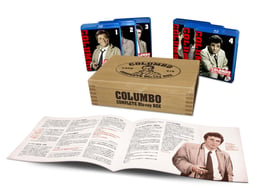Columbo
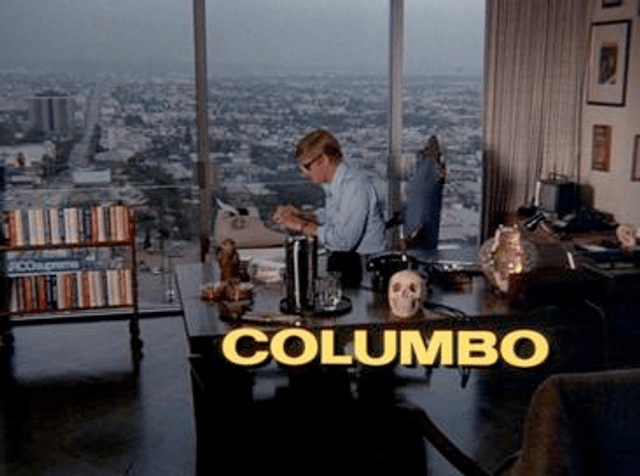
Columbo

| Columbo | |
|---|---|
| Genre | Crime drama Detective fiction Neo-noir |
| Created by | Richard Levinson William Link |
| Starring | Peter Falk |
| Country of origin | United States |
| Originallanguage(s) | English |
| No.of seasons | 10 |
| No.of episodes | 69(list of episodes) |
| Production | |
| Executiveproducer(s) | Philip Saltzman[1] |
| Camera setup | Single-camera |
| Running time | 73–98 minutes |
| Productioncompany(s) | Universal Television (1971–78, 1989–98, 2002–03) Studios USA (1998–2002) |
| Distributor | MCA TV |
| Release | |
| Original network | NBC (1968–1978) ABC (1989–2003) |
| Picture format | Film |
| Audio format | Mono (1968-1978) Stereo (1989-2003) |
| Original release | February 20, 1968 (1968-02-20) – January 30, 2003 (2003-01-30) |
Columbo (/kəˈlʌmboʊ/) is an American television series starring Peter Falk as Columbo, a homicide detective with the Los Angeles Police Department.[2][3] The character and show, created by Richard Levinson and William Link, popularized the inverted detective story format, which begins by showing the commission of the crime and its perpetrator; the plot therefore usually has no "whodunit" element, and instead revolves around how a perpetrator known to the audience will finally be caught and exposed (sometimes referred to as a "howcatchem").
Columbo is a shrewd but inelegant blue-collar homicide detective whose trademarks include his rumpled beige raincoat, unassuming demeanor, and frequent cigar smoking. His suspects are often affluent members of high society who try to carefully cover their tracks. Initially dismissive of Columbo's circumstantial speech and apparent ineptitude, they become increasingly unsettled as his pestering behavior leads him to tease out incriminating evidence. His relentless approach often leads to self-incrimination or an outright confession by the suspect.
Episodes of Columbo are between 70 and 98 minutes long, and have been broadcast in 44 countries. The 1971 episode "Murder by the Book", directed by Steven Spielberg, was ranked No. 16 on TV Guide's 100 Greatest Episodes of All Time[4] and in 1999, the magazine ranked Lt. Columbo No. 7 on its 50 Greatest TV Characters of All Time list.[5][6] In 2012, the program was chosen as the third-best cop or legal show on Best in TV: The Greatest TV Shows of Our Time.[7] In 2013, TV Guide included it in its list of The 60 Greatest Dramas of All Time[8] and ranked it at #33 on its list of the 60 Best Series.[9] Also in 2013, the Writers Guild of America ranked it No. 57 in the list of 101 Best Written TV Series.[10]
| Columbo | |
|---|---|
| Genre | Crime drama Detective fiction Neo-noir |
| Created by | Richard Levinson William Link |
| Starring | Peter Falk |
| Country of origin | United States |
| Originallanguage(s) | English |
| No.of seasons | 10 |
| No.of episodes | 69(list of episodes) |
| Production | |
| Executiveproducer(s) | Philip Saltzman[1] |
| Camera setup | Single-camera |
| Running time | 73–98 minutes |
| Productioncompany(s) | Universal Television (1971–78, 1989–98, 2002–03) Studios USA (1998–2002) |
| Distributor | MCA TV |
| Release | |
| Original network | NBC (1968–1978) ABC (1989–2003) |
| Picture format | Film |
| Audio format | Mono (1968-1978) Stereo (1989-2003) |
| Original release | February 20, 1968 (1968-02-20) – January 30, 2003 (2003-01-30) |
Episodes
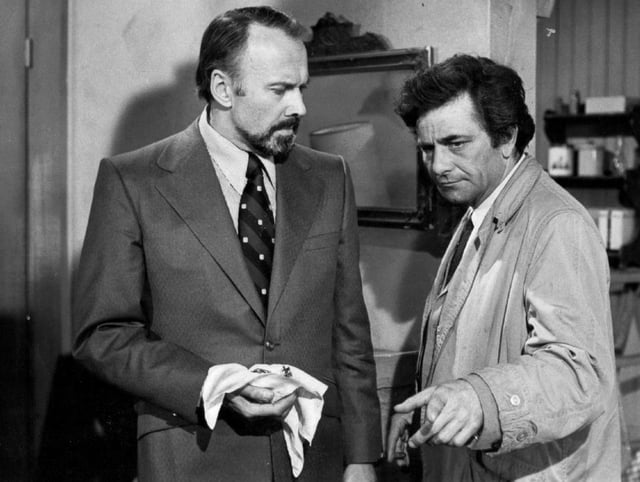
Richard Kiley and Peter Falk in Season 3 Episode 8 titled "A Friend in Deed" that aired on May 5, 1974
| Season | Episodes | Originally aired | ||||
|---|---|---|---|---|---|---|
| First aired | Last aired | Network | ||||
| Pilots | 2 | February 20, 1968 (1968-02-20) | March 1, 1971 (1971-03-01) | NBC | ||
| 1 | 7 | September 15, 1971 (1971-09-15) | February 9, 1972 (1972-02-09) | |||
| 2 | 8 | September 17, 1972 (1972-09-17) | March 25, 1973 (1973-03-25) | |||
| 3 | 8 | September 23, 1973 (1973-09-23) | May 5, 1974 (1974-05-05) | |||
| 4 | 6 | September 15, 1974 (1974-09-15) | April 27, 1975 (1975-04-27) | |||
| 5 | 6 | September 14, 1975 (1975-09-14) | May 2, 1976 (1976-05-02) | |||
| 6 | 3 | October 10, 1976 (1976-10-10) | May 22, 1977 (1977-05-22) | |||
| 7 | 5 | November 21, 1977 (1977-11-21) | May 13, 1978 (1978-05-13) | |||
| 8 | 4 | February 6, 1989 (1989-02-06) | May 1, 1989 (1989-05-01) | ABC | ||
| 9 | 6 | November 25, 1989 (1989-11-25) | May 14, 1990 (1990-05-14) | |||
| 10 + specials | 14 | December 9, 1990 (1990-12-09) | January 30, 2003 (2003-01-30) | |||
After two pilot episodes, the show originally aired on NBC from 1971 to 1978 as one of the rotating programs of The NBC Mystery Movie. Columbo then aired less regularly on ABC beginning in 1989 under the umbrella of The ABC Mystery Movie.[11] The last episode was broadcast in 2003 as part of ABC Thursday Night at the Movies.[12]
In almost every episode the audience sees the crime unfold at the beginning and knows the identity of the culprit, typically an affluent member of society. Once Columbo enters the story (he rarely appears in the first act), viewers watch him solve the case by sifting through the contradictions between the truth and the version presented to him by the killer(s). This style of mystery is sometimes referred to as a "howcatchem", in contrast to the traditional whodunit. In structural analysis terms, the majority of the narrative is therefore dénouement, a feature normally reserved for the very end of a story. Episodes tend to be driven by their characters, the audience observing the criminal's reactions to Columbo's increasingly intrusive presence. The explanation for the crime and its method having played out as part of the narrative, most of the stories simply end with the criminal's reaction at being found out.
In the beginning of every episode, Columbo's genius was hidden by his frumpy, friendly and disarming demeanor, luring the killer into a false sense of security. In some cases, the killer's arrogance and dismissive attitude allow Columbo to manipulate his suspects into self-incrimination. While the details, and eventually the motivation(s), of the murderers' actions are shown to the viewer, Columbo's true thoughts and intentions are almost never revealed until close to the end of the episode. (Often he begins to whistle the tune "This Old Man" as the pieces begin to fall into place.) Columbo generally maintains a friendly relationship with the murderer until the end. The point at which the detective first begins to suspect the murderer is generally not revealed, although it is often fairly early on. Columbo had a duality of character; the disarming and unkempt detective and the hidden genius sleuth. The genius would sometimes starkly manifest itself through his eyes as it did when Jack Cassidy’s killer escaped from the hand-cuffs in his magic show. Such moments always bode bad tidings for the killer. In some instances, such as Ruth Gordon's avenging elderly mystery writer in "Try and Catch Me", Janet Leigh's terminally ill and deluded actress in "Forgotten Lady", Donald Pleasence's elegant vintner in "Any Old Port in a Storm", and Johnny Cash's enserfed singer in "Swan Song", the killer is more sympathetic than the victim.[13]
Each case is generally concluded in a similar style, with Columbo dropping any pretense of uncertainty and sharing details of his conclusion of the killer's guilt. Following the killer's reaction, the episode generally ends with the killer confessing or quietly submitting to arrest. There are few attempts to deceive the viewer or provide a twist in the tale. One convoluted exception is "Last Salute to the Commodore", where Robert Vaughn is seen elaborately disposing of a body, but is proved later to have been covering for his alcoholic wife, whom he mistakenly thought to be the murderer.[14]
Development and character profile

The Stahl House served as the filming location of the first Columbo pilot "Prescription: Murder" with guest stars Gene Barry, Nina Foch and William Windom.
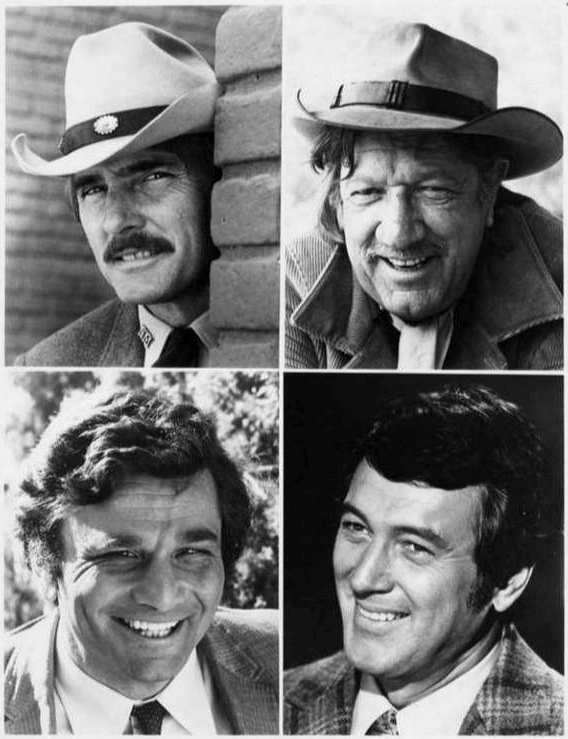
The NBC Mystery Movie program worked on a rotating basis – one per month from each of its shows. Top left: Dennis Weaver in McCloud. Top right: Richard Boone in Hec Ramsey. Bottom left: Peter Falk in Columbo. Bottom right: Rock Hudson in McMillan & Wife
The character of Columbo was created by the writing team of Richard Levinson and William Link, who said that Columbo was partially inspired by Fyodor Dostoevsky's Crime and Punishment character Porfiry Petrovich[15] as well as G. K. Chesterton's humble cleric-detective Father Brown. Other sources claim Columbo's character is also influenced by Inspector Fichet from the French suspense-thriller film Les Diaboliques (1955).[16]
The character first appeared in a 1960 episode of the television-anthology series The Chevy Mystery Show, titled "Enough Rope". This was adapted by Levinson and Link from their short story "May I Come In", which had been published as "Dear Corpus Delicti" in an issue of Alfred Hitchcock's Mystery Magazine. The short story did not include Columbo as a character.[17] The first actor to portray Columbo, character actor Bert Freed, was a stocky character actor with a thatch of grey hair.[18]
Freed's Columbo wore a rumpled suit and smoked a cigar, but he otherwise had few of the other now-familiar Columbo mannerisms. However, the character is still recognizably Columbo, and uses some of the same methods of misdirecting and distracting his suspects. During the course of the show, the increasingly frightened murderer brings pressure from the district attorney's office to have Columbo taken off the case, but the detective fights back with his own contacts.
Although Freed received third billing, he wound up with almost as much screen time as the killer and appeared immediately after the first commercial. This delayed entry of the character into the narrative of the screen play became a defining characteristic of the structure of the Columbo series. This teleplay is available for viewing in the archives of the Paley Center for Media in New York City and Los Angeles.
Levinson and Link then adapted the TV drama into the stage play Prescription: Murder. This was first performed at the Curran Theatre in San Francisco on January 2, 1962, with Oscar-winning character actor Thomas Mitchell in the role of Columbo. Mitchell was 70 years old at the time. The stage production starred Joseph Cotten as the murderer and Agnes Moorehead as the victim. Mitchell died of cancer while the play was touring in out-of-town tryouts; Columbo was his last role.
In 1968, the same play was made into a two-hour television movie that aired on NBC. The writers suggested Lee J. Cobb and Bing Crosby for the role of Columbo, but Cobb was unavailable and Crosby turned it down because he felt it would take too much time away from the golf links. Director Richard Irving convinced Levinson and Link that Falk, who excitedly said he "would kill to play that cop", could pull it off even though he was much younger than the writers had in mind.[19]
Originally a one-off TV-Movie-of-the-Week, Prescription: Murder has Falk's Columbo pitted against a psychiatrist (Gene Barry). In this movie, the psychiatrist gives the new audience a perfect description of Columbo's character. Due to the success of this film, NBC requested that a pilot for a potential series be made to see if the character could be sustained on a regular basis, leading to the 1971 hour and a half film, Ransom for a Dead Man, with Lee Grant playing the killer. The popularity of the second film prompted the creation of a regular series on NBC, that premiered in the fall of 1971 as part of The NBC Mystery Movie wheel series rotation: McCloud, McMillan & Wife, and other whodunits. In the episode Murder by the Book, hardcore Columbo fans may notice the killer signing a paperback book titled, Prescription: Murder.
According to TV Guide, the original plan was that a new Columbo episode would air every week, but as a motion picture star, Peter Falk refused to commit to such an arduous schedule, which would have meant shooting an episode every five days. The network arranged for the Columbo segments to air once a month on Wednesday nights. The high quality of Columbo, McMillan & Wife, and McCloud was due in large part to the extra time spent on each episode. The term wheel show was coined to describe this format, and additional such series were attempted by NBC, but the astounding success of The NBC Mystery Movie series was not repeated.
Columbo was an immediate hit in the Nielsen ratings and Falk won an Emmy Award for his role in the show's first season. In its second year the Mystery Movie series was moved to Sunday nights, where it then remained during its seven-season run. The show became the anchor of NBC's Sunday night line up. Columbo aired regularly from 1971–78 on NBC. After its cancellation by NBC in 1978, Columbo was revived on ABC between 1989 and 2003 in several new seasons and a few made-for-TV movie "specials".[20]
Columbo's wardrobe was personally provided by Peter Falk; they were his own clothes, including the high-topped shoes and the shabby raincoat, which made its first appearance in Prescription: Murder. Falk would often ad lib his character's idiosyncrasies (fumbling through his pockets for a piece of evidence and discovering a grocery list, asking to borrow a pencil, becoming distracted by something irrelevant in the room at a dramatic point in a conversation with a suspect, etc.), inserting these into his performance as a way to keep his fellow actors off-balance. He felt it helped to make their confused and impatient reactions to Columbo's antics more genuine.[21]
A few years prior to his death, Falk had expressed interest in returning to the role. In 2007, he claimed he had chosen a script for one last Columbo episode, "Columbo: Hear No Evil". The script was renamed "Columbo's Last Case". ABC declined the project. In response, producers for the series announced that they were attempting to shop the project to foreign production companies.[22][23] However, Falk was diagnosed with dementia in late 2007.[24] During a 2009 court trial over Falk's care, Dr Stephen Read stated that the actor's condition had deteriorated so badly that Falk could no longer remember playing a character named Columbo, nor could he identify who Columbo was.[24] Falk died on June 23, 2011, aged 83.[25][26][27]
Contributors
Directors and writers
The first season première "Murder by the Book" was written by Steven Bochco and directed by Steven Spielberg. Jonathan Demme directed the seventh-season episode "Murder Under Glass". Jonathan Latimer was also a writer. Actor Ben Gazzara, a friend of Falk's, directed the episodes "A Friend in Deed" (1974) and "Troubled Waters" (1975).
Falk himself directed the last episode of the first season, "Blueprint for Murder". Actor Nicholas Colasanto, best known for playing Coach on Cheers, directed two episodes, "Swan Song" with Johnny Cash, and "Étude in Black".
Patrick McGoohan directed five episodes (including three of the four in which he played the murderer) and wrote and produced two (including two of these). Vincent McEveety was a frequent director, and homage was paid to him by a humorous mention of a character with his surname in the episode "Undercover" (which he directed).
Two episodes, "No Time to Die" and "Undercover", were based on the 87th Precinct novels by Ed McBain,[28] and thus do not strictly follow the standard Columbo/inverted detective story format.
Score composers
Columbo episodes contain a variety of music that contributes to the uniqueness of each. The score becomes of particular importance during turning points of the plots. "The Mystery Movie Theme" by Henry Mancini, written for The NBC Mystery Movie series, was used extensively in the whole of 38 episodes, from 1971 to 1977. Unlike the other elements of the Mystery Movie wheel, Columbo never had an official theme as such, although some composers, such as Dick DeBenedictis and Gil Mellé, did write their own signature pieces. Several composers created original music for the series, which was often used along with "The Mystery Movie Theme":
Dick DeBenedictis (23 episodes, 1972–2003)
Patrick Williams (9 episodes, 1977–92)
Bernardo Segall (10 episodes, 1974–76)
Billy Goldenberg (7 episodes, 1971–74)
Gil Mellé (4 episodes, 1971–72)
Jeff Alexander (1 episode, 1975)
Oliver Nelson (1 episode, 1972)
Dave Grusin (1 episode, 1968)
Bob Prince (1 episode, 1977)
Jonathan Tunick (1 episode, 1978)
John Cacavas (3 episodes, 1989–91)
James Di Pasquale (2 episodes, 1990)
Steve Dorff (2 episodes, 1991)
Dennis Dreith (1 episode, 1990)
Richard Markowitz (1 episode, 1990)
David Michael Frank (1 episode, 1990)
Ken Jordan (1 episode, 2003)
Series Music department included:
Henry Mancini — composer: "Mystery Movie" theme / "Sunday Mystery Movie" theme (38 episodes, 1971–77)
Hal Mooney — music supervisor (27 episodes, 1972–76)
Mike Post — composer: "Mystery Movie" theme (9 episodes, 1989–90)
Patrick Williams received two Emmy nominations for Outstanding Music Composition for a Series in 1978 (for "Try and Catch Me") and 1989 (for "Murder, Smoke and Shadows"). Billy Goldenberg was nominated in the same category in 1972 for "Lady in Waiting".
Columbo also featured an unofficial signature tune, the children's song "This Old Man". It was introduced in the episode "Any Old Port in a Storm" in 1973 and the detective can be heard humming or whistling it often in subsequent films. Peter Falk admitted that it was a melody he personally enjoyed and one day it became a part of his character.[29] The tune was also used in various score arrangements throughout the three decades of the series, including opening and closing credits. A version of it, titled "Columbo", was created by one of the show's composers, Patrick Williams.[30]
Awards and nominations
Columbo received numerous awards and nominations from 1971 to 2005, including 13 Emmys, two Golden Globe Awards, two Edgar Awards and a TV Land Award nomination in 2005 for Peter Falk.[31]
| Awards and nominations | |||||||||||||||||||||||||||||||||||||||||||||||||||||||||||||||||||||||||||||||||||||||||||||||||||||||||||||||||||||||||||||||||||||||||||||||||||||||||||||||||||||||||||||||||||||||||||||||||||||||||||||||||||||||||||||||
|---|---|---|---|---|---|---|---|---|---|---|---|---|---|---|---|---|---|---|---|---|---|---|---|---|---|---|---|---|---|---|---|---|---|---|---|---|---|---|---|---|---|---|---|---|---|---|---|---|---|---|---|---|---|---|---|---|---|---|---|---|---|---|---|---|---|---|---|---|---|---|---|---|---|---|---|---|---|---|---|---|---|---|---|---|---|---|---|---|---|---|---|---|---|---|---|---|---|---|---|---|---|---|---|---|---|---|---|---|---|---|---|---|---|---|---|---|---|---|---|---|---|---|---|---|---|---|---|---|---|---|---|---|---|---|---|---|---|---|---|---|---|---|---|---|---|---|---|---|---|---|---|---|---|---|---|---|---|---|---|---|---|---|---|---|---|---|---|---|---|---|---|---|---|---|---|---|---|---|---|---|---|---|---|---|---|---|---|---|---|---|---|---|---|---|---|---|---|---|---|---|---|---|---|---|---|---|---|---|---|---|---|---|---|---|---|---|---|---|---|---|---|---|---|
| |||||||||||||||||||||||||||||||||||||||||||||||||||||||||||||||||||||||||||||||||||||||||||||||||||||||||||||||||||||||||||||||||||||||||||||||||||||||||||||||||||||||||||||||||||||||||||||||||||||||||||||||||||||||||||||||
Home media
DVD
Because the Columbo episodes from 1989 to 2003 were aired very infrequently, different DVD sets have been released around the world. In many Region 2 and Region 4 countries, all episodes have now been released as ten seasons, with the tenth season covering the last 14 shows from "Columbo Goes to College" (1990) to the most recent "Columbo Likes the Nightlife" (2003). However, in France and The Netherlands (also Region 2), the DVDs were grouped differently and released as twelve seasons.
In Region 1, all episodes from seasons 8 on are grouped differently; all the episodes that were originally aired on ABC were released under the title COLUMBO: The Mystery Movie Collection.
| Season | Eps. | Year | DVD release | |||||
|---|---|---|---|---|---|---|---|---|
| DVD name | Region 1 | Region 2 | Region 4 | |||||
| Pilots | 2 | 1968–71 | The Complete First Season | September 7, 2004 | September 13, 2004 | December 3, 2004 | ||
| 1 | 7 | 1971–72 | ||||||
| 2 | 8 | 1972–73 | The Complete Second Season | March 8, 2005 | July 18, 2005 | July 13, 2005 | ||
| 3 | 8 | 1973–74 | The Complete Third Season | August 9, 2005 | November 14, 2005 | July 20, 2006 | ||
| 4 | 6 | 1974–75 | The Complete Fourth Season | March 14, 2006 | September 18, 2006 | September 19, 2006 | ||
| 5 | 6 | 1975–76 | The Complete Fifth Season | June 27, 2006 | February 12, 2007 | March 21, 2007 | ||
| 6 | 3 | 1976–77 | The Complete Sixth & Seventh Seasons | November 21, 2006 | April 30, 2007 | May 2, 2007 | ||
| 7 | 5 | 1977–78 | ||||||
| 8 | 4 | 1989 | The Mystery Movie Collection 1989(R1/R4) The Complete Eighth Season(R2) | April 24, 2007 | March 31, 2008 | July 4, 2008 | ||
| 9 | 6 | 1989–90 | The Mystery Movie Collection 1990(R1) The Complete Ninth Season(R2/R4) | February 3, 2009 | March 30, 2009 | May 6, 2009 | ||
| 10 + specials | 14 | 1990–93 | The Mystery Movie Collection 1991–93(R1) The Complete Tenth Season – Volume 1(R2/R4) | February 8, 2011[34] | June 15, 2009 | July 28, 2009 | ||
| 1994–2003 | The Mystery Movie Collection 1994–2003(R1) The Complete Tenth Season – Volume 2(R2/R4) | January 10, 2012[35] | July 27, 2009 | November 28, 2009 | ||||
| Complete series | 69 | 1968–2003 | Columbo: The Complete Series | October 16, 2012 | October 19, 2009 | December 7, 2016 | ||
Blu-ray
To commemorate the death of Peter Falk, the complete series was released on Blu-ray in Japan as a ten-season set, taken from new HD masters and original 1.33:1 (4:3) aspect ratio (1989–2003 episodes are presented in 1.78:1 (16:9)).[36] The set contains 35 discs and is presented in a faux-wooden cigar box. It features a brochure with episode details, and a script for the Japanese version of Prescription: Murder. Special features include the original 96-minute version of Étude In Black and the original NBC Mystery Movie title sequence. In addition, many episodes include isolated music and sound-effects tracks.[37] Before the release of this set, only the episodes up to Murder, a Self-Portrait were released on DVD in Japan.
Other appearances
Stage
The Columbo character first appeared on stage in 1962 in "Prescription: Murder" with Thomas Mitchell in the role of Columbo.
In 2010, Prescription: Murder, was revived for a tour of the United Kingdom with Dirk Benedict and later John Guerrasio as Columbo.[38]
Television
Falk appeared as Columbo in an Alias sketch produced for a 2003 TV special celebrating the 50th anniversary of ABC.
Falk appeared in character as Columbo in 1977 at The Dean Martin Celebrity Roast of Frank Sinatra.
Books

Columbo, as he appeared in volume 7 of Detective Conan
A Columbo series of books was published by MCA Publishing, written by authors Alfred Lawrence, Henry Clements and Lee Hays. This series of books, with the first title published in 1972, were mostly adapted from the TV series.[39]
Columbo was also used as the protagonist for a series of novels published between 1994 and 1999 by Forge Books, an imprint of Tor Books. All of these books were written by William Harrington.
William Link, the co-creator of the series, has written a collection of Columbo short stories, titled The Columbo Collection, which was published in May 2010 by Crippen & Landru, the specialty mystery publisher.[40]
Sculpture
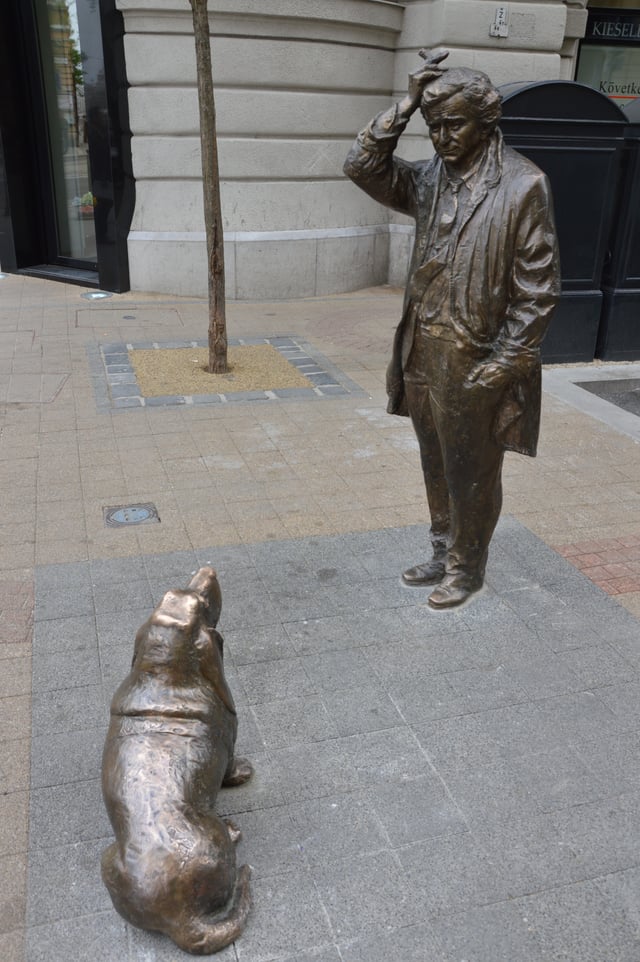
Peter Falk statue as Columbo with his dog in Budapest, Hungary
A statue of Lieutenant Columbo and his dog was unveiled in 2014 on Miksa Falk Street in Budapest, Hungary.[41] According to Antal Rogán, then-district mayor of the city, Peter Falk may have been related to Hungarian writer and politician Miksa Falk, although there is no evidence yet to prove it.[42]
Podcast
A podcast about Columbo was launched in 2014, primarily considering episodes of the television series.[43]
Mrs. Columbo spin-off
Mrs. Columbo, a spin-off TV series starring Kate Mulgrew, aired in 1979 and was canceled after only thirteen episodes. Lt. Columbo was never seen on Mrs. Columbo; each episode featured the resourceful Mrs. Columbo solving a murder mystery she encountered in her work as a newspaper reporter. Connections with the original Columbo series were made obvious: the glaring presence of Columbo's car in the driveway, Dog, and Mrs. Columbo emptying ashtrays containing the famous green cigar butts—all featured in the show's opening sequence. References were also made to Kate's husband being a police lieutenant.
See also
Furuhata Ninzaburō
